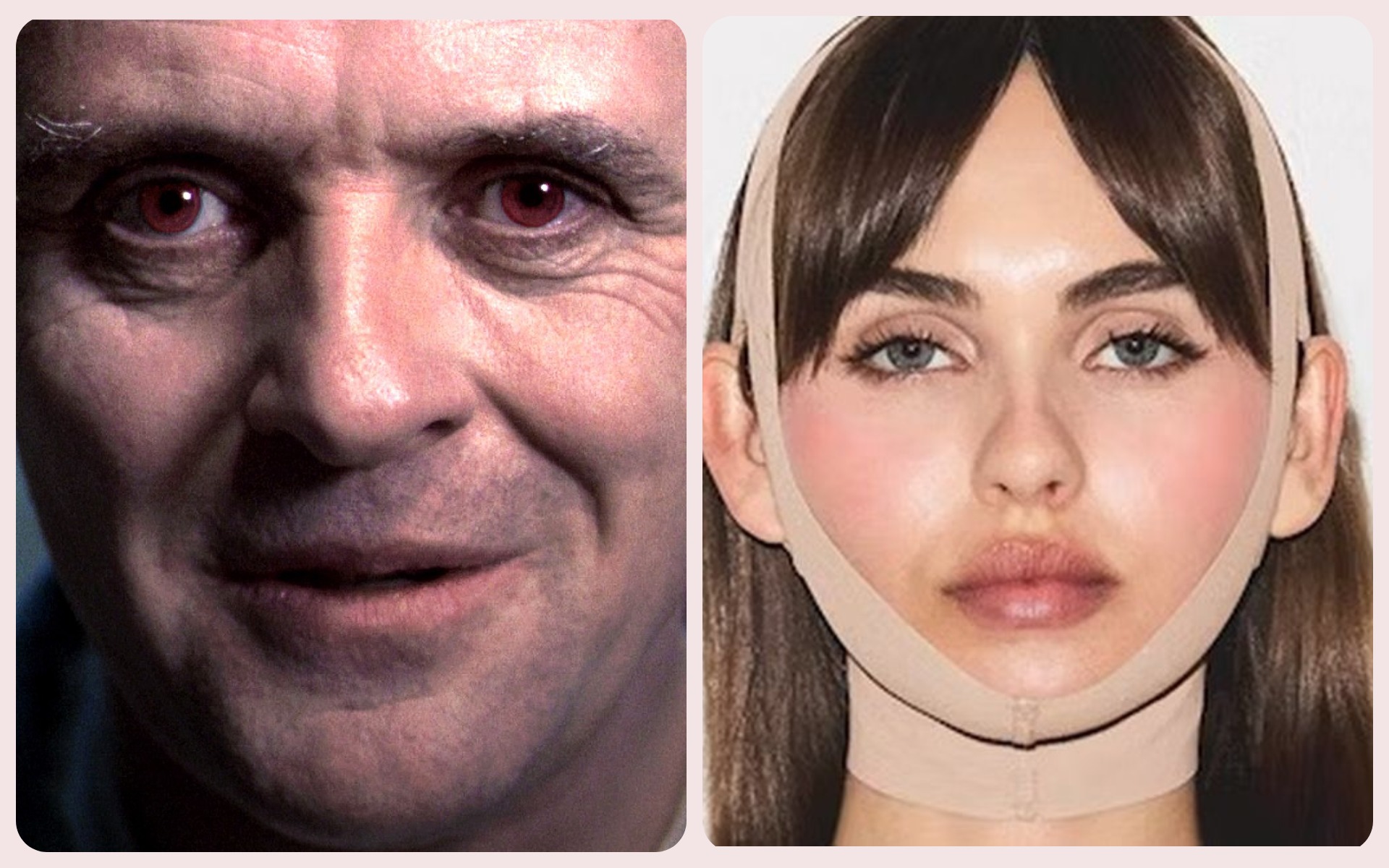When Kim Kardashian unveiled her Skims Seamless Sculpt Face Wrap—cosmetic, collagen-infused jaw sculpting at its most avant-garde—few expected a lesson from the man who made torture chic. That is, until Anthony Hopkins emerged from cinematic limbo to wear the wrap and deliver lines as Hannibal Lecter himself.

At 87, the Oscar-winning star dared to turn a TikTok beauty trend into a viral comedy sketch. Wearing the suspiciously snug wrap, Hopkins deadpanned, “Hello, Kim… I’m already feeling ten years younger.” He tagged Kardashian and Skims, then sealed the gag with a whisper of his iconic “fava beans and Chianti” sentiment. A brief shot of Hopkins clasping his wrists—the way Lecter Once did—and one surreal minute later, the face-wrap saga outpaced every beauty influencer trying to ride the launch wave.
The Face Wrap That Became a Meme
Skims promoted the wrap as ergonomic sculpting—engineered fabric, collagen fibers, elasticity—to lift and firm the jawline. It retailed around $45. Critics and dermatologists swiftly weighed in, calling it more novelty than transformation. Many compared it to compression tape; physicians warned of skin irritation, lymphatic obstruction, or potential muscle loss if worn long-term. The New York Post called it a fad that trades in insecurity, not results.
But Hopkins’ cameo flipped the script. A trend that launched with shopping site links and influencer testimonials was now a cultural commentary. A single cameo image chronicled present-day health culture, celebrity spectacle, and horror iconography in cinematic tandem.
Anthony Hopkins tries Kim Kardashian’s latest face shapewear product.
— Film Updates (@FilmUpdates) August 1, 2025
How Hopkins Made It Epic
Hopkins didn’t need special effects. His callback to Silence of the Lambs was instantaneous, his tone velvet-dark, his punchline elegantly savage. Fans flooded social media: “Is Hannibal joining the brand team?” “Even Lecter thinks it’s creepy.” One Redditor quipped, “That face wrap just got dissected by its own horror inventor.”
The post landed across entertainment outlets, turning Skims’ structured campaign into an accidental crossover between Hollywood legacy and modern absurdity. Hopkins’ delivery was deadpan enough to upend marketing, yet affectionate enough to avoid insult.
Skims: Provocation, PR, and Unexpected Endorsement
Skims thrives on spectacle. From seam-free bras to statement shapewear, Kardashian has built a brand rooted in controversy. Her newest product seemed built for a “will-it-blow-up?” moment. And with Hopkins dropping the spoon full of medicine, it did—except from the other direction.
Skims did not comment directly on Hopkins’ video, but insiders say Kardashian herself appreciated the humor. The brand has embraced the edge: advertising that elicits discussion—even if through parody—is good advertising.

What Hopkins’ Joke Revealed
-
Beauty overreach: Even Hollywood royalty finds some beauty hacks absurd.
-
Legacy power: One reference to Hannibal punctured months of influencer hoopla.
-
Meme mechanics: When Hopkins mocks luxury skincare, trending hashtags follow.
For celebrities launching products, the message is clear: even your endorsed fad can become parody in 60 seconds flat.
Pop Culture Backlash: Skincare Meets Satire
Media coverage exploded. Page Six praised Hopkins for “slicing through social media vanity with metal precision.” The Cut wrote about Hannibal’s take: “a dentist nightmare turned cosmetic commentary.” Reddit threads replicated the video as user-generated art—Hopkins in wrap, Lecter’s stare, hashtags declaring “Instagram’s gone full horror show.”
Meanwhile cultural critics in The Guardian and others wrote about Kardashian’s brand empire, asking whether her marketing leans too heavily on performance and not enough on substance—especially when critics warn that wellness trends often prey on insecurity rather than improve lives.
Final Thoughts: A Mask That Became a Message
Kim Kardashian’s face wrap was a brand stunt; Anthony Hopkins’ parody turned it into a cultural moment. Hopkins didn’t just mock a product—he reminded us that beauty culture remains deeply performative. If a man who starred as a cinematic psychiatrist finds your mask scary, maybe it’s time to rethink it.
No hate, no smear; just one cinematic icon breaking the joke apart with quiet dignity. The real takeaway: some trends invite outside critique—and the higher the profile, the sharper the satire.
Whether Skims responds or Kardashian laughs it off, Hopkins has made a statement: beauty is temporary, but comedy—and class—endures.
📚 Active Sources List
-
Page Six story on Hopkins’ Instagram parody of Skims face wrap
-
The New York Post’s dermatologist opinions on Skims wrap efficacy
-
Reddit memes and discussion forums comparing wrap to Hannibal mask
-
The Cut analysis discussing how beauty meets horror satire
-
Guardian commentary on Kardashian’s branding and beauty culture critique


